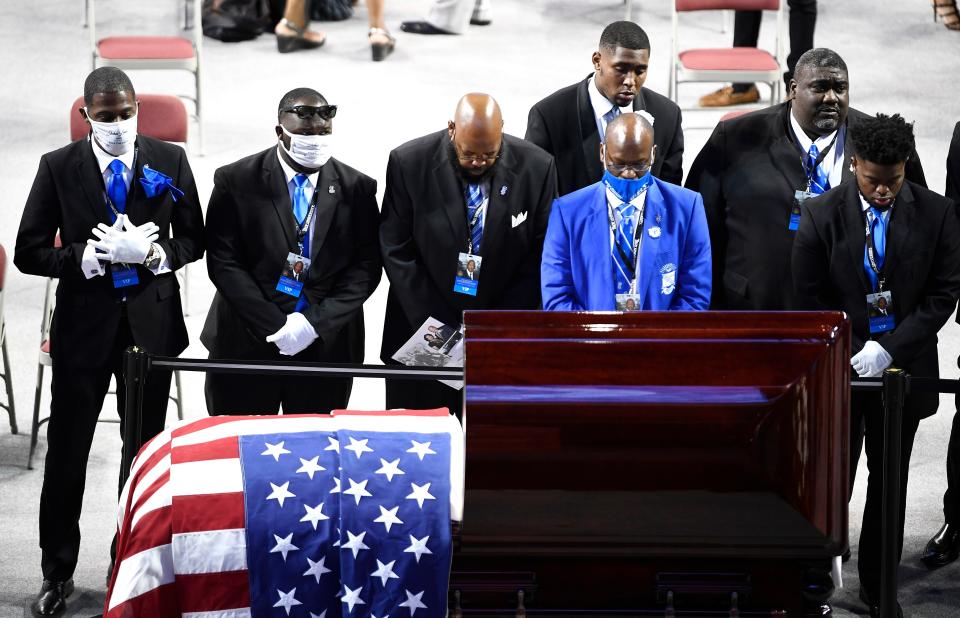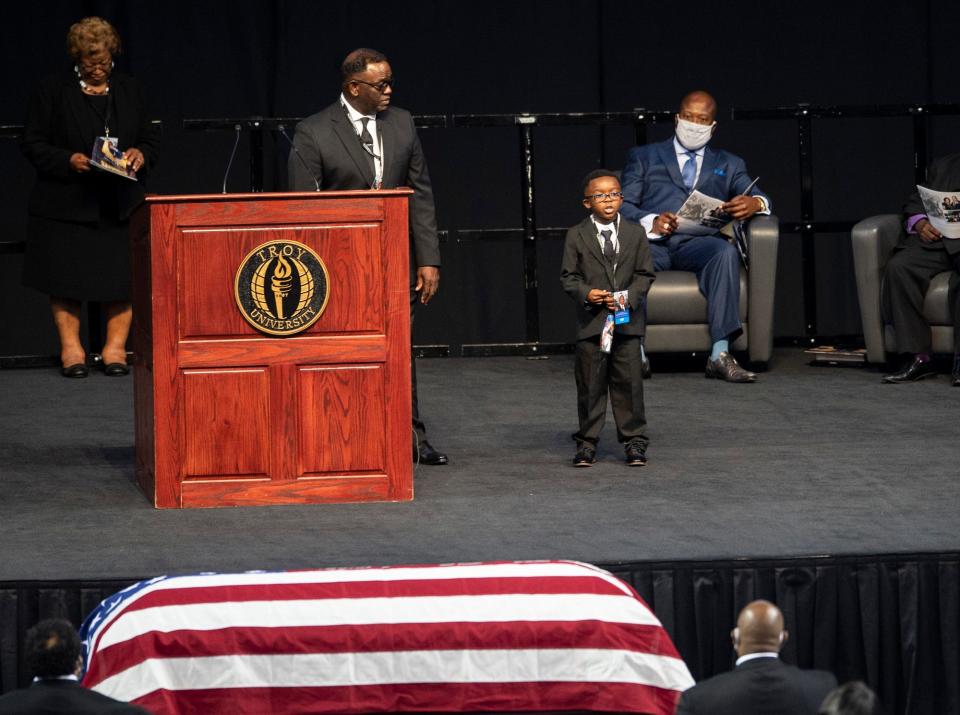Final crossing in Selma: Procession across Edmund Pettus Bridge honors John Lewis
The Edmund Pettus Bridge, which crosses the Alabama River in Selma, bears the weight of seminal moments in the civil rights movement. The weight of seminal moments with seminal figures.
John Lewis, who walked the bridge with about 600 other voting rights advocates on March 7, 1965, was among those who helped make that demonstration a pivotal one in the fight for African-American suffrage.
On that day, police infamously beat demonstrators bloody – earning the day the moniker "Bloody Sunday." Lewis suffered a fractured skull.
But that bloody march eventually helped lead to the passage of Voting Rights Act of 1965.
On a Sunday morning 55 year later, a procession honoring Lewis crossed the bridge, following the route of that historic Bloody Sunday march.
Lewis, who represented Georgia's 5th Congressional District for more than 30 years, died this month after a battle with pancreatic cancer. He was 80 years old.
Six days of memorial services celebrating the life of Lewis began Saturday in his hometown of Troy, Alabama, where he was memorialized by family members, gospel singer Dottie Peoples and local dignitaries.
Click below to hear more about John Lewis and his lifelong fight for civil rights.
The Troy ceremony commenced a weeklong series of services across five different cities. His body was moved to Selma following the service and a viewing in Troy. Events will then move to Montgomery. After Lewis lies in state at the Alabama State Capitol, he will lie in state at the U.S. Capitol in Washington, D.C., then at the Georgia State Capitol.
More: How to watch weekend events honoring John Lewis in Alabama
Lewis lies in state at Alabama Capitol
Lewis’ body was then taken from Selma, along the historic 1965 march route, to the Alabama Capitol in the afternoon to lie in repose.
Gov. Kay Ivey helped place a flower arranged in front of Lewis' casket before several members of Alabama's congressional delegation, including Rep. Terri Sewell, Rep. Martha Roby and Sen. Doug Jones, circled the casket one last time.
Sewell, a Selma native who called Lewis a mentor and longtime friend, rested a hand over her heart before walking away.
An unexpected guest at the intimate ceremony was Peggy Wallace Kennedy, the daughter of the late former Gov. George Wallace, who stoked racist fervor in Alabama as a political strategy, becoming the face of defiance of voting and civil rights for Black people. Kennedy has long been outspoken about grappling with the legacy of her father, who she says was on the "wrong side" of history. In 2019, Kennedy published a book about the reckoning of her family's segregationist past. In it, she writes of watching the Bloody Sunday march and her horror, then kept private, at watching the beating of the man she would later learn was Lewis.
Lewis crosses Selma bridge one final time
Lewis’ casket traveled by horse-drawn carriage across the Edmund Pettus Bridge over the Alabama River about 10:54 a.m.
Mourners broke out in song as the carriage moved along Broad Street in downtown Selma onto the bridge.
The final crossing for Lewis was 55 years, four months and 19 days since Bloody Sunday when he was beaten by law enforcement while advocating for better voting access for all.
At the bottom of the bridge, he was honored and saluted by Alabama state troopers, the same organization who beat him and others on Bloody Sunday. The honoring by the law enforcement agency is a symbolic moment of change for Alabama and the country as a whole.
The solemn live television footage of his funeral procession over the river is in stark contrast to the television footage of the beatings protesters endured in 1965. That feed by national outlets led to a country being shocked by the violence, ultimately opening their eyes to what was happening in Alabama. Then ultimately President Lyndon B. Johnson signed the Voting Rights Act into law.
Later he will be honored by state officials at the Capitol in the same building where Gov. George Wallace oversaw state law enforcement who beat Lewis and other protesters and where Wallace fought for a segregated state for decades.
Memorial procession to Edmund Pettus Bridge begins
After a brief service outside Brown Chapel A.M.E. church, a 9-person military escort carried Lewis' flag-draped casket to a horse-drawn wagon. Lewis will travel the Selma streets a final time before crossing the Edmund Pettus Bridge.
U.S. Rep. Terri Sewell gives opening remarks before final march across Pettus Bridge
Terri Sewell gave the opening remarks outside the Brown Chapel A.M.E. Church on Sunday morning.
Sewell, a Democrat was raised in Selma, is celebrated locally for her academic and professional success. She attended Princeton University as an undergraduate, went onto Oxford University and attended law school at Harvard University. She is the first Black woman to ever serve in the Alabama Congressional delegation.
She is a lifelong member of the Brown Chapel A.M.E.
"In this deeply sorrowful time of loss, I find comfort in being here today with so many loved ones and those who are so lucky to have shared John's warmth and love," Sewell said Sunday, thanking the Lewis family. "Thank you so much for sharing John with the world. Thank you for accompanying John to Selma one last time. Even more importantly, thank you for sharing him over and over again."
"Our nation is better off because of John Robert Lewis. My life is better. Selma is better. This nation and this world are better because of John Robert Lewis."
Sewell said she misses Lewis "dearly."
"On Bloody Sunday in 1965, John was confronted by Alabama state troopers and their dogs. They beat him with billy clubs and fractured his skull. But John was determined to fight for equality and justice, putting his own life on the line in the service of others, and a brighter future for everyone. John crossed bridges so many times, insisting our nation live up to the ideals on which it was founded."
Mourners sing 'This Little Light of Mine' at bridge Sunday morning
Hundreds of mourners lined Broad Street at the foot of the Edmund Pettus Bridge Sunday morning, waiting to watch U.S. Rep. John Lewis cross for the final time.
They struck a jubilant tone as they waited in the heat, singing “This Little Light of Mine” and embracing one another with smiles.
Local activist Sherrette Spice, also known as Lady Freedom, said Lewis’ last journey was a symbolic turning point for the movement he led. Now it was time for the next generation to carry the cause.
“He started some great work that must be finished. He lit some great torches that we cannot let die,” she said. “We must continue to take them to those dark places to bring people out of darkness.”
Reverence, remembrance in Troy
A Saturday morning service took place at Troy University, a school that wouldn't admit Lewis because he was Black.
Troy Chancellor Dr. Jack Hawkins, who gave the opening remarks, referenced that snub as one Lewis often brought up in their meetings over the years.
"He would always remind me with that sheepish grin that in 1957, he was denied admission to (Troy University)," Hawkins said, "and then he would quickly tell me that 32 years later, we had the good sense to award him the honorary doctorate."
Hawkins also announced that a university leadership program would be renamed “The Congressman John Lewis Leadership Conference” in the congressman's memory.

Troy Mayor Jason Reeves recalled a moment when he noticed Alabama state troopers escorting Lewis' body into Troy, and he reflected on the significance, considering Lewis' Bloody Sunday demonstration.
"As I stood down there and watched his body be brought in, over the top of the casket, I saw an Alabama state trooper ... (Lewis) became a figure all around the world known ... for confronting Alabama state troopers," Reeves said. "And now they will lead his body around this state as we celebrate his life."
Inspired by 'good trouble'
Lewis' family members – his brothers and sisters especially – spoke for most of the ceremony, often invoking Lewis' famous call to "get in good trouble, necessary trouble."
"He often told us, if you see something wrong, do something," said his sister, Rosa Mae Tyner. "His actions showed us just that. In a time when going to jail was perceived as trouble, he reminded us that it was good trouble, necessary trouble. See something, say something, do something."
More: Rep. John Lewis to lie in state next week at the US Capitol
In his lifetime, Lewis was arrested at least 45 times.
Brother Henry “Grant” Lewis recounted the moment John Lewis was sworn into Congress the first time.
"During the swearing in ceremony, right before the swearing in ceremony, he looked up, he knew where I was sitting, and he looked and he gave me the thumbs up and I gave him the thumbs up back," he said. "So after the event was over, we were together and I asked him, I said, 'John, what were you thinking when you gave me the thumbs up?' He said, 'I was thinking, this is a long way from the cotton fields of Alabama.'"
Lewis' parents had worked as sharecroppers in Pike County, Alabama. John Lewis was the third of 10 children.

Jaxon Lewis Brewster, Lewis' 7-year-old great-nephew, spoke briefly, calling his uncle his "hero."
"It's up to us to keep his legacy alive," Jaxon said, drawing laughter and applause from the crowd as he stepped down from the stage.
The ceremony was filled with musical tributes, as well.
More: 'Keep his legacy alive': John Lewis' nephew speaks at Troy memorial service
Gospel singer Dottie Peoples closed the service with a rendition of her song, "He's an On Time God." Lewis' fraternity, Phi Beta Sigma, honored Lewis with a performance.
Leading prayers throughout the service, the Rev. Darryl Caldwell referenced Lewis' commitment.
"Thank you, true and righteous judge, for John Lewis and his engagement in good trouble," Caldwell prayed. "Good trouble that confronted institutionalized racism, good trouble that compelled this boy from Troy, the conscious of Congress, (to champion) the cause of the disinherited, despised and disenfranchised."
Contributing: Bro Krift, Montgomery Advertiser
Contributing: Associated Press
This article originally appeared on USA TODAY: John Lewis memorial: His final crossing of Edmund Pettus Bridge

